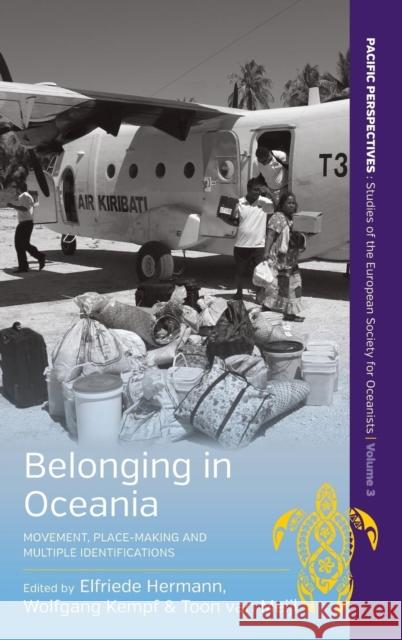Belonging in Oceania: Movement, Place-Making and Multiple Identifications » książka
Belonging in Oceania: Movement, Place-Making and Multiple Identifications
ISBN-13: 9781782384151 / Angielski / Twarda / 2014 / 232 str.
"I am impressed by the direction and content of this book. It offers a timely engagement with the important social science concepts of movement, place-making, and multiple-identifications. But whereas in other recent studies these notions have usually been theorized and empiricised as isolates, here they are triangulated in an intellectually original and productive way." - Tom Ryan, University of Waikato Ethnographic case studies explore what it means to "belong" in Oceania, as contributors consider ongoing formations of place, self and community in connection with travelling, internal and international migration. The chapters apply the multi-dimensional concepts of movement, place-making and cultural identifications to explain contemporary life in Oceanic societies. The volume closes by suggesting that constructions of multiple belongings-and, with these, the relevant forms of mobility, place-making and identifications-are being recontextualized and modified by emerging discourses of climate change and sea-level rise. Elfriede Hermann is Professor at the Institute of Cultural and Social Anthropology at the University of Gottingen and has conducted research with the Ngaing of Papua New Guinea, the Banabans of Rabi Island (Fiji) and Banaba Island (Kiribati), and the inhabitants of Kiribati. Wolfgang Kempf has taught cultural anthropology at the Universities of Tubingen, Heidelberg and Gottingen and is currently a researcher at the Institute of Cultural and Social Anthropology at the University of Gottingen. He has conducted fieldwork among the Ngaing of Madang Province, Papua New Guinea, among the Banabans of Fiji, and in Kiribati. Toon van Meijl is Professor of Anthropology and Head of the Department of Anthropology and Development Studies at Radboud University Nijmegen in the Netherlands, and Director of the interdisciplinary Centre for Pacific and Asian Studies at Nijmegen. Since 1982 van Meijl has conducted 30 months of ethnographic fieldwork among the Tainui Māori in New Zealand.
"I am impressed by the direction and content of this book. It offers a timely engagement with the important social science concepts of movement, place-making, and multiple-identifications. But whereas in other recent studies these notions have usually been theorized and empiricised as isolates, here they are triangulated in an intellectually original and productive way." · Tom Ryan, University of WaikatoEthnographic case studies explore what it means to "belong" in Oceania, as contributors consider ongoing formations of place, self and community in connection with travelling, internal and international migration. The chapters apply the multi-dimensional concepts of movement, place-making and cultural identifications to explain contemporary life in Oceanic societies. The volume closes by suggesting that constructions of multiple belongings-and, with these, the relevant forms of mobility, place-making and identifications-are being recontextualized and modified by emerging discourses of climate change and sea-level rise. Elfriede Hermann is Professor at the Institute of Cultural and Social Anthropology at the University of Göttingen and has conducted research with the Ngaing of Papua New Guinea, the Banabans of Rabi Island (Fiji) and Banaba Island (Kiribati), and the inhabitants of Kiribati.Wolfgang Kempf has taught cultural anthropology at the Universities of Tübingen, Heidelberg and Göttingen and is currently a researcher at the Institute of Cultural and Social Anthropology at the University of Göttingen. He has conducted fieldwork among the Ngaing of Madang Province, Papua New Guinea, among the Banabans of Fiji, and in Kiribati.Toon van Meijl is Professor of Anthropology and Head of the Department of Anthropology and Development Studies at Radboud University Nijmegen in the Netherlands, and Director of the interdisciplinary Centre for Pacific and Asian Studies at Nijmegen. Since 1982 van Meijl has conducted 30 months of ethnographic fieldwork among the Tainui Māori in New Zealand.











